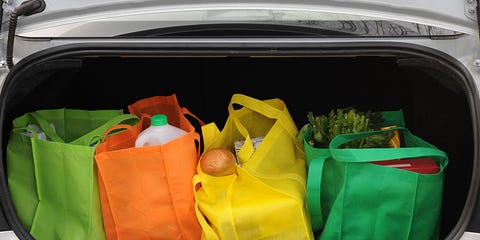How Long Can Cheese Sit in a Car

McIninch/Getty Images
There are plenty of things that make running errands in warm weather really nice. Like, not feeling as if your face is going to freeze off while you hustle from your car to the store. And not having to worry about snow, ice, or sleet turning all the roads and parking lots into a complete mess.
One thing that's not so nice? Hot temperatures mean all that food you just bought at the supermarket is basically a ticking time bomb for harmful bacteria growth. (Put those groceries to good use with the 180+ recipes inPrevention's Eat Clean, Lose Weight & Love Every Bite—try it FREE for 21 days!)
Before you start rolling your eyes and muttering something about thefood safety police, consider this: You'd obviously never store groceries in a metal box that's sitting out in the summer sun, right? But when you pack your bags in the car, that's exactly what you're doing. On hot, sunny days, the temperature inside your car can soar to as high as 172 degrees, according to the CDC. Not exactly ideal for stuff like meat, fish, chicken, or dairy. (Pushed your luck? Here are4 signs you have food poisoning.)
Of course, that number will start to drop once you open your windows or crank up the air conditioning. But the inside of your car still be more than warm enough for nasty bugs that could potentiallymake you sick to start flourishing on your food.
How long do you have?
Exactly how long do you have before that pack of chicken cutlets or quart of milk starts to go south? The answer depends on where you live and what the weather is like, says Deirdre Schlunegger, CEO of the nonprofit public health organization STOP Foodborne Illness. Still, the specifics are almost beside the point. "Heat is a good medium for bacteria growth, so you want to minimize it as much as you can. The less time you have between shopping and going home, the better," she says. (These are the 9 foods most likely to make you sick.)
That means no stopping off at the bank or wandering into the wholesale club after you're done at the market. "If you need to make other stops, do those before you go to the grocery store," Schlunegger says. (You know what would make your life a lot easier? Grocery shopping online.)
Pack carefully
It also means being smart about shopping for and packing up your groceries. In the store, get into the habit of sweeping through the meat and dairy aisles last, to ensure that those items spend the least amount of time in your cart. Once you reach the checkout counter, pack the cold items in an insulated bag with an ice pack. If you have a long ride home, it might even be worth storing your stuff in a cooler to keep it extra chilled, says Schlunegger. (Looking for less waste? This is what a package-free grocery store looks like.)
From Prevention Premium: How To Detect, Treat, And Prevent Lyme Disease
Location, location, location
Once you reach the car, put your bags inside the passenger area, Schlunegger recommends. Even if you don't use the AC, it'll still be infinitely cooler than your furnace of a trunk. Then head straight home and get everything into the refrigerator or freezer ASAP.
Sure, this might feel a little hypervigilant. But it sure beats getting food poisoning. (And if you do end up getting sick, here's how to recover fast.)
Marygrace Taylor Marygrace Taylor is a health and wellness writer for Prevention, Parade, Women's Health, Redbook, and others.
This content is created and maintained by a third party, and imported onto this page to help users provide their email addresses. You may be able to find more information about this and similar content at piano.io
How Long Can Cheese Sit in a Car
Source: https://www.prevention.com/food-nutrition/g20466086/how-long-can-groceries-sit-in-hot-car-without-making-you-sick/